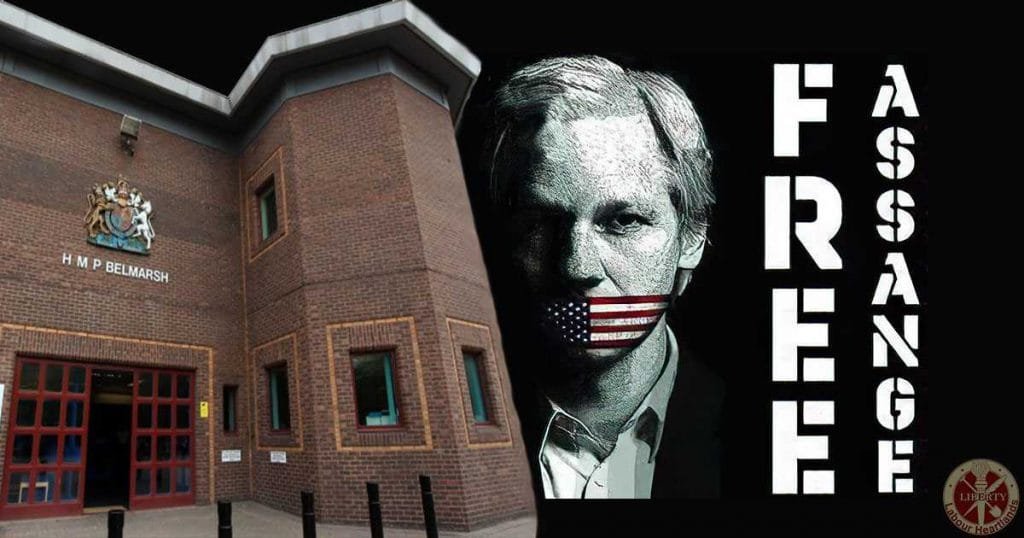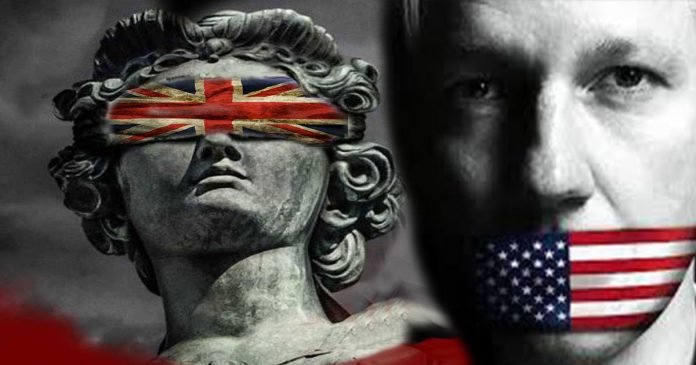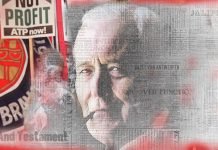The High court is to rule on WikiLeaks founder Julian Assange’s US extradition today
Today, a British judge will decide if WikiLeaks founder Julian Assange will be extradited to the United States to face espionage charges for publishing secret US military documents.
The story of how we got here is as long as it’s tragic, Assange, whose trial began in February last year and concluded in October, is currently being held at the maximum-security Belmarsh prison in southeast London.
Julian Assange is regarded by many as a hero who uncovered war crimes and corruption and is the embodiment of modern investigative journalism, having dealt with huge amounts of leaked data.
In July 2010, WikiLeaks, together with several media outlets, such as The Guardian, New York Times, published more than 90,000 US military documents related to the War in Afghanistan.
These included previously unreported details about civilian deaths, friendly-fire casualties, US air raids, al-Qaeda’s role in the country, and nations providing support to Afghan leaders and the Taliban.
Among the most notorious material published by WikiLeaks is the “Collateral Murder” video, released in 2010. It depicts a 2007 episode in Baghdad in which US Apache helicopter personnel enthusiastically slaughtered a dozen Iraqis, including two Reuters staffers – a fitting hint, perhaps, as to the existential perils of journalistic efforts to document the truth.
In Assange’s case, his crime is just that: telling the truth in contravention of an official narrative of heroic, world-saving interventions by the US military.
WikiLeaks shot to fame soon after the website released the 39-minute video of a US military Apache helicopter firing over and killing more than a dozen Iraqis, including two Reuters journalists.
The footage leaked by private Manning led to global outrage, reigniting a debate over the US’s occupation of Iraq and wider presence in the Middle East.
The July 2007 attack was made public with the video being shown over mainstream media, a move that angered the Pentagon so much, it had drawn up a report identifying the whistleblower website as a threat to national security. The US defence department was embarrassed when that confidential report appeared on the Wikileaks site alongside a slew of other military documents.
The release of the video from Baghdad also comes shortly after the US military admitted that its special forces attempted to cover up the killings of three Afghan women in a raid in February by digging the bullets out of their bodies.
The Pentagon blocked an attempt by Reuters to obtain the video through a freedom of information request. Wikileaks director Julian Assange said his organisation had to break through encryption by the military to view it.
After the 2010 leaks, the United States government launched a criminal investigation into WikiLeaks.
In November 2010, Sweden issued an international arrest warrant for Assange over allegations of sexual assault. Assange said the allegations were a pretext for him to be extradited from Sweden to the United States because of his role in publishing secret American documents.
After failing in his battle against extradition to Sweden, he breached bail and took refuge in the Embassy of Ecuador in London in June 2012. He was granted asylum by Ecuador on the grounds of political persecution, with the presumption that if he was extradited to Sweden, he would be eventually extradited to the US.
On 11 April 2019, Assange’s asylum was withdrawn following a series of disputes with the Ecuadorian authorities. The police were invited into the embassy, and he was arrested.
He was found guilty of breaching the Bail Act and sentenced to 50 weeks in prison. The United States government unsealed an indictment against Assange, related to the leaks provided by Chelsea Manning. On 23 May 2019, the United States government further charged Assange with violating the Espionage Act of 1917.
The investigation into Assange was reopened in May 2019 following his dramatic removal from Ecuador’s embassy in central London the previous month. Swedish authorities had previously suspended the probe in 2017.
In November 2019 Sweden dropped the rape allegations and the investigation, deputy director of public prosecution Eva-Marie Persson made the announcement at a news conference in Stockholm.
Although officials said they believed the women’s claims to be “credible,” they have now said that there does not appear to be enough evidence for an indictment. This follows a June decision by a Swedish court that Assange should not be detained.
Many questions had been asked about the case including Sir Keir Starmer’s involvement of the U.K. Director of Public Prosecutions at the time Sir Keir Starmer, Ken Loach calling him out directly asking Starmer:
“what were his dealings in the Julian Assange case.” “Starmer should be challenged, what does he know?”
Ken loach went on to State: ” this should be a test for him! Starmer speaks of openness in his dealings, well let him be open about this, and let’s hear what he says about the torture and the illegal oppression of Julian Assange.”
During Assanges’s exile, he and Wikileaks continued to anger the American government or the power behind the government.
During the 2016 U.S. election campaign, WikiLeaks published confidential Democratic Party emails, showing that the party’s national committee favoured Hillary Clinton over her rival Bernie Sanders in the primaries.
In 2018, Special Counsel Robert Mueller charged twelve Russian intelligence officers with computer hacking and working with WikiLeaks and other organisations to disseminate the material. Assange said that the Russian government was not the source of the documents.
The UK now have the unenviable task of extraditing Julian Assange or carrying out justice.
Editors from newspapers including The Washington Post and The New York Times, as well as press freedom organisations, criticised the government’s decision to charge Assange under the Espionage Act, characterising it as an attack on the First Amendment to the United States Constitution, which guarantees freedom of the press.
The Assange case creates a precedent that mortally threatens freedom of the press in Britain. If Assange is extradited then any journalist who publishes information that the American authorities deem to be classified, however well-known or harmless it may be, will risk being extradited to face trial in America. The US secretary of state, Mike Pompeo, says that non-Americans like Assange do not enjoy First Amendment rights to free expression.
“If Julian Assange is extradited to the US, the very idea of a journalism that’s free is lost. No journalist who dares to challenge rapacious power and reveal the truth will be safe.” -John Pilger
Veteran reporter John Pilger also issued a stark warning ahead of a landmark court hearing, saying that if WikiLeaks founder Julian Assange is extradited to the US “no journalist who challenges power will be safe”.
The outcome of the Assange extradition hearing is a crucial tipping point which will tell if Britain and the US go further down the same path towards “illiberal democracy” as Turkey, Hungary, Brazil, India and the Philippines. What Assange and WikiLeaks did – obtaining important information about the deeds and misdeeds of the US government and giving that information to the public – is exactly what all journalists ought to do.
Lawyers for the US government have sought the extradition of Assange to the US to face 17 charges under the Espionage Act of 1917 and one charge of computer misuse. At the heart of their case is the accusation that in leaking a trove of classified US diplomatic and military cables in 2010, Assange and WikiLeaks endanger the lives of US agents and informants.
Patrick Cockburn is an award-winning Independent columnist who specialises in analysis of Iraq, Syria and wars in the Middle East he recently stated one of the many peculiarities in this strange case is that the evidence for any such thing is non-existent. The Pentagon has admitted that it failed to find a single person covertly working for the US who had been killed as a result of the WikiLeaks disclosures. This failure was not for lack of trying: The Pentagon had set up a special military task force, deploying 120 counter-intelligence officers, to find at least one death that could be blamed on Assange and his colleagues but had found nothing.
Other allegations against Assange put forward by the lawyers for the US government are similarly flimsy or demonstrably false, yet he is still in real danger of being sent to a maximum security prison in the US after the court makes its ruling on 4 January. Once there he faces a sentence of up to 175 years and, whatever the length of his incarceration, he is likely to spend it in solitary confinement in a tiny cell.
It is clear Julian Assange was acting as a journalist and within the First Amendment
Barry J. Pollack, a lawyer for Mr Assange, said his client was being charged with a crime “for encouraging sources to provide him truthful information and for publishing that information.” That dramatic step, he said, removed the “fig leaf” that the case about his client was only about hacking.
The US extradition request is based on charges that stem directly from the publication of classified documents as part of Julian Assange’s journalistic work with WikiLeaks. Publishing such information is a cornerstone of media freedom and the public’s right to access public interest information, and must be protected rather than criminalised.
“These unprecedented charges demonstrate the gravity of the threat the criminal prosecution of Julian Assange poses to all journalists in their endeavour to inform the public about actions that have been taken by the U.S. government,” he said.
For most of American history, it was rare for the government to treat the leaking of its secrets to the news media as a crime. But starting in the second half of the George W. Bush administration and accelerating during the Obama administration, the Justice Department began making much more routine use of the Espionage Act to go after officials who provided information to the public through reporters, as opposed to actual spies. The World War I-era law criminalizes the disclosure of potentially damaging national security secrets to someone not authorized to receive them.
On its face, the Espionage Act could also be used to prosecute reporters who publish government secrets. But many legal scholars believe that prosecuting people for acts related to receiving and publishing information would violate the First Amendment.

That notion has never been tested in court, however, because until now the government has never brought such charges.
Though he is not a conventional journalist, much of what Julian Assange does at WikiLeaks is difficult to distinguish in a legally meaningful way from what traditional news organisations like The Times do: seek and publish information that officials want to be secret, including classified national security matters, and take steps to protect the confidentiality of sources.
In the US, Assange could face trial on 18 charges – 17 of them under the USA’s Espionage Act, and one under the Computer Fraud and Abuse Act. He would also face a real risk of serious human rights violations, including detention conditions that could amount to torture or other ill-treatment, and the possibility of prolonged solitary confinement. Assange is the first publisher to face charges under the Espionage Act.
The fact that Assange was the target of a negative publicity campaign by US officials at the highest levels undermines his right to be presumed innocent and puts him at risk of an unfair trial.
“We are all citizens of the world”
It’s a shame the new age of America does not want to extend its first amendment its advocation for ‘freedom of speech.
It was early in the Seventeenth Century that Francis Bacon remarked on three recent inventions already transforming the world: the compass, gunpowder and the printing press. Now the links between the nations first forged by the compass have made us all citizens of the world, the hopes and threats of one becoming the hopes and threats of us all. In that one world’s effort to live together, the evolution of gunpowder to its ultimate limit has warned mankind of the terrible consequences of failure.
And so it is to the printing press—to the recorder of man’s deeds, the keeper of his conscience, the courier of his news—that we look for strength and assistance, confident that with your help man will be what he was born to be: free and independent.
This article fetched extracts from:
WikiLeaks, Disclosure, Free Speech and Democracy: New Media and the Fourth Estate JENNIFER ROBINSON
Ken Loach calls out Sir Keir Starmer, what were his dealings in the Julian Assange case
Support Independent Journalism Today
Our unwavering dedication is to provide you with unbiased news, diverse perspectives, and insightful opinions. We're on a mission to ensure that those in positions of power are held accountable for their actions, but we can't do it alone. Labour Heartlands is primarily funded by me, Paul Knaggs, and by the generous contributions of readers like you. Your donations keep us going and help us uphold the principles of independent journalism. Join us in our quest for truth, transparency, and accountability – donate today and be a part of our mission!
Like everyone else, we're facing challenges, and we need your help to stay online and continue providing crucial journalism. Every contribution, no matter how small, goes a long way in helping us thrive. By becoming one of our donors, you become a vital part of our mission to uncover the truth and uphold the values of democracy.
While we maintain our independence from political affiliations, we stand united against corruption, injustice, and the erosion of free speech, truth, and democracy. We believe in the power of accurate information in a democracy, and we consider facts non-negotiable.
Your support, no matter the amount, can make a significant impact. Together, we can make a difference and continue our journey toward a more informed and just society.
Thank you for supporting Labour Heartlands












